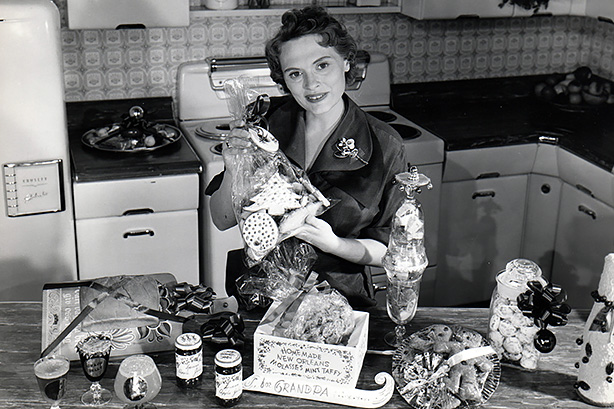
Kit Sigety '44 in a publicity photo from NBC's "Home" show in the 1950s. Photo: provided.
Katharine 'Kit' (Snell) Sigety '44: Food TV pioneer was a natural in front of the camera
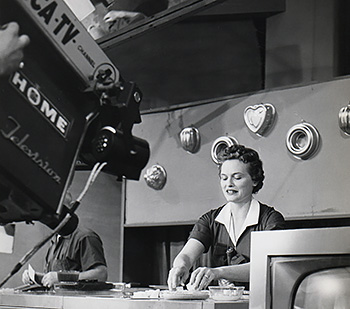
Kit Sigety '44 in a publicity photo from NBC's "Home" show in the 1950s, where she appeared as Kit Kinne, "TV's Number One food authority," from 1953-56. Photo: provided.
Kit Sigety '44 was one of America's first television cooking show hosts.
First appearing in 1951 as "Sally Smart" on New York City's WOR-TV's "Sally Smart's Kitchen," she went on the air, live, five days a week, doing all the commercials herself. She then joined NBC's "Home" show serving as the show's food editor and appearing as Kit Kinne, "TV's Number One food authority." From 1953-56, she offered the American woman tips and demonstrations, hosting episodes with guests such as James Beard, Charles Laughton and Gertrude Lawrence.
By speaking to the camera as if it were a person and by imagining herself in the homes of her national audience, Kit drew the devotion of viewers for her friendly demeanor and her poise as she pioneered the art of cooking on live TV.
Kit's experiences led to the creation, with her husband, Charles Sigety, of Video Vittles, a company that specialized in preparing camera-ready food for television shows and commercials.
Kit Sigety recently chatted with Ezra Update writer Kate Klein and shared stories, memories and wisdom from the first decade of food TV.
What brought you to Cornell?
I wanted to go to Cornell from the time I was a little girl. My siblings and I used to spend all our summers in Ovid, New York, with my grandmother, who loved Cornell. My sisters, Cornelia '40, Julie '42, Mary '47, and I all graduated from Cornell.
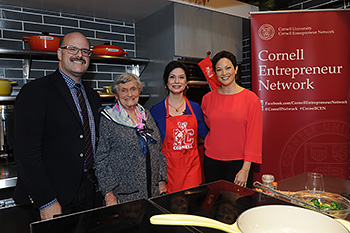
In February 2016, Sigety, second from left, participated in a Cornell Entrepreneur Network NYC event, "The Business of Food Media," along with (from left) Mitchell Davis '91, Amy Riolo '95 and Ellie Krieger '88. Photo: Diane Bondareff.
What were your experiences like at Cornell?
I was a Tri-Delta, but I was not a very dedicated sorority girl since I was involved in a number of other activities. I was president of the freshman class, president of the women's self-government [organization] and president of Risley Hall.
I majored in institutional management, which I loved since it involved cooking. I knew how to cook when I went to Cornell -- my grandmother and my mother had taught me to cook. I also learned a number of other things about the hospitality and food service businesses. At the same time, I became comfortable in public speaking due to my involvement in campus politics. Obviously this would come in handy later.
How did you make the transition from Cornell to television?
I took a roundabout route. During World War II, I volunteered for the Red Cross and was sent to the European theater. I was stationed in Italy and worked in a Red Cross recreation program with the GIs. During my time in Italy, I did some broadcasting and emcee work as part of this program.
I came back to the states in 1946 after the war and moved to New York City with my sister, Julie. In 1947 I met my husband Charlie, who was in Yale Law School at the time and had already graduated from Harvard Business School. After we were married, we moved to New Haven.
I definitely wanted to work but I didn't want to do an ordinary job. So, I sold corsets and girdles door-to-door. I knew what my customers wanted and my confidence from Cornell and the Red Cross made me a successful saleswoman. I was told if I sold a hundred girdles, the company would make me district sales manager in New Haven. So I did sell my hundred. After becoming the district manager I recruited Yale law student wives to sell corsets door to door for me. We had a whole group going! It was great fun and taught me good salesmanship.
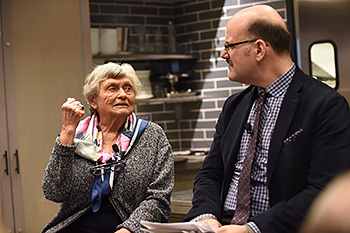
Sigety speaks during the February Cornell Entrepreneur Network panel in New York City. Photo: Diane Bondareff.
How did you get the job as Sally Smart on WOR-TV?
After graduating from law school, Charlie and I moved to New York City and I needed a job. I found a job listing for an assistant on a television food show. When I went for the interview, it turned out to be the job of Sally Smart on WOR-TV, not just the assistant's position.
I guess I was the type of woman they were looking for. I certainly wasn't shy about wanting to work and possibly working in front of the camera. The audition was a food demonstration. I'd never done a one before. The producers said, "That's all right. Just take this book on food demonstration techniques, and read it. Come back on Monday. You're going to do a half-hour live show." And that's just what I did.
I had to plan all of the meals I was going to cook on the show. I would study cookbooks like crazy and pick out things I thought could fit in. My goal was to help women, like the ones I had met selling girdles, to cook something different or faster or better. I just wanted help make their lives a bit easier.
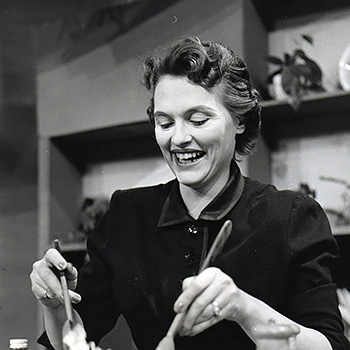
Sigety in a publicity photo from NBC's "Home" show in the 1950s. Photo: provided.
It was really a one-woman production. I did have an assistant off camera who would hand me things. Everything was measured before we started, but we cooked live. I still would need to cook most recipes in advance so that I would have a finished product to show the audience. It was all done live -- no retakes, no do-overs.
How did you host a show and cook at the same time?
My mother had never seen any television, but when I told her what I was going to be doing she wrote me a letter and said, "You know, Kit, if I was going to have to do a television show, I would just talk to the camera exactly how you would talk to a single person instead of an audience. Pretend that you're in that person's home."
Did you ever get nervous?
I don't think so. It really wasn't too hard for me. It all came very naturally. I never really thought much about how many people were watching. As a matter of fact, I was always amazed when anybody said they would like my autograph.
My husband and I decided to start a family and I didn't want my work to stop me. In fact, I did a television show the day Birge (the oldest of my five children) was born. It's hard to believe, but I went right from the studio to the hospital to have my first baby.
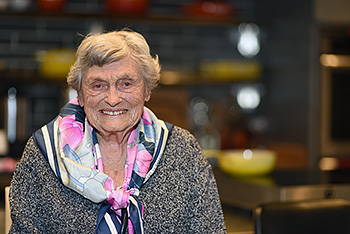
Sigety at the February CEN panel in New York City. Photo: Diane Bondareff.
I was doing a Dole pineapple commercial that day and Dole had brought all their salesmen from all over the country to meet me. I realized as I was going into this meeting that I was never going to be able to sit through it since I was in labor. So I said to the Dole people, "I'm sorry, I've made another appointment previously," and that was all the time I could give them. I went right off to the hospital and Birge was born that night.
What's your favorite story about cooking on TV?
I was asked to do a commercial for Wesson cooking oil. I put the oil in a Pyrex saucepan, so the viewers could see through the pot. I put the popcorn in and let it pop. While it was cooking and the corn was popping, the pan started to disintegrate. So with the camera rolling on live television the pot disintegrated and I was left holding only the handle! I went straight into a filmed Wesson commercial so they could clean it all up.
Do you still enjoy cooking?
Oh, I love it. I'm a great believer that you can open your refrigerator and see what you have in it and then create something. I hardly use a recipe anymore.